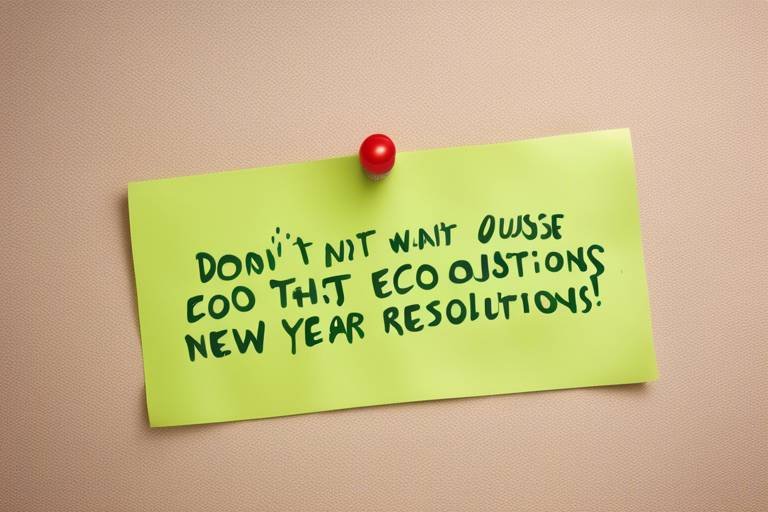How to Make Eco-friendly New Year Resolutions?
As the New Year approaches, many of us find ourselves reflecting on the past year and thinking about how we can improve in the coming months. What if, instead of the usual resolutions focused solely on personal gains, we shifted our focus to the planet? Making eco-friendly New Year resolutions is not just a trend; it's a necessity in today's world where environmental issues are more pressing than ever. These resolutions can lead to substantial changes in our habits, ultimately contributing to a healthier planet. So, how do we craft these resolutions in a way that is not only meaningful but also achievable? Let's explore some practical strategies that can help you make a positive impact this New Year.
Eco-friendly resolutions are commitments we make to reduce our environmental footprint and promote sustainability. They can range from simple daily habits to larger lifestyle changes. The significance of these resolutions lies in their potential to create a ripple effect; when we make conscious choices, we inspire those around us to do the same. Imagine if everyone made just one small change—like using reusable bags or reducing meat consumption. Collectively, these actions can lead to a substantial decrease in waste and resource consumption. Understanding the importance of these resolutions can ignite a passion for change, motivating individuals to adopt greener habits.
One of the key elements of successful resolutions is setting realistic goals. It’s easy to get excited and aim for lofty ambitions, but if they're too far out of reach, we risk feeling overwhelmed and giving up. Instead, consider breaking down your eco-friendly goals into smaller, manageable steps. For instance, instead of vowing to go completely plastic-free overnight, you might start by eliminating single-use plastics from your shopping list. This gradual approach not only increases the likelihood of success but also helps you develop a sustainable mindset over time. Remember, the journey towards sustainability is a marathon, not a sprint!
Before diving into new resolutions, take a moment to evaluate your current habits. This self-assessment is crucial for identifying areas where you can improve. Are you a chronic plastic user? Do you often forget to bring your reusable bags when shopping? By pinpointing these habits, you can formulate specific, actionable eco-friendly resolutions tailored to your lifestyle. For example, if you find that you often buy bottled water, a resolution to invest in a reusable water bottle could be a perfect fit.
Recognizing wasteful habits is a pivotal step in making impactful changes. Common wasteful practices include:
- Using disposable coffee cups instead of a reusable mug
- Buying fast fashion instead of sustainable clothing
- Overusing electricity by leaving lights on
By addressing these habits, you can create resolutions that focus on reducing waste and promoting sustainability. For instance, committing to bring your own coffee cup to your favorite café can significantly cut down on waste. It’s all about making conscious choices that align with your eco-friendly goals!
Monitoring your progress is essential to stay motivated and accountable. There are various methods to track your eco-friendly resolutions, such as keeping a journal, using apps designed for habit tracking, or even sharing your goals on social media. Celebrating small victories along the way can also boost your morale. Did you remember to bring your reusable bag to the store this week? Give yourself a pat on the back! These little wins can keep the momentum going and make the journey enjoyable.
Integrating sustainable practices into your daily routine can enhance your eco-friendly resolutions. Start by making small changes that fit seamlessly into your lifestyle. For example, consider:
- Cooking at home more often to reduce food waste
- Opting for public transport or biking instead of driving
- Composting kitchen scraps to reduce landfill waste
These practices not only contribute to your resolutions but also foster a more sustainable lifestyle overall. The key is to find what works for you and make it a part of your everyday life.
Participating in community programs can amplify your eco-friendly efforts. Whether it’s joining a local clean-up crew or participating in sustainability workshops, engaging with others can provide motivation and support. Plus, it’s a great way to meet like-minded individuals who share your passion for the environment. Working together on community initiatives can lead to significant changes and foster a sense of camaraderie.
Identifying local resources can support your eco-friendly resolutions. Many communities have organizations and initiatives focused on sustainability, from recycling programs to community gardens. These resources can provide valuable assistance and inspiration. Check out local farmers' markets, environmental groups, and workshops that promote sustainable living. You might be surprised by what’s available right in your own backyard!
Establishing accountability can significantly boost your commitment to eco-friendly resolutions. Consider partnering with a friend or family member who shares your goals. You can check in with each other regularly to discuss progress and challenges. Alternatively, you might join online communities or social media groups focused on sustainability. Sharing your journey with others can provide encouragement and keep you on track with your goals.
Q: What are some examples of eco-friendly resolutions?
A: Some examples include reducing single-use plastics, composting, using public transportation, or committing to buy local produce.
Q: How can I stay motivated with my eco-friendly resolutions?
A: Track your progress, celebrate small victories, and engage with community initiatives to stay motivated.
Q: Can eco-friendly resolutions really make a difference?
A: Absolutely! Every small change contributes to a larger impact on the environment.
Q: How do I find local resources for sustainability?
A: Look for local environmental organizations, farmers' markets, and community groups focused on sustainability in your area.

Understanding Eco-friendly Resolutions
This article explores practical strategies for creating sustainable New Year resolutions that benefit the environment, encouraging readers to adopt greener habits and contribute to a healthier planet.
So, what exactly are eco-friendly resolutions? Simply put, they are commitments to make choices that are better for our planet. As we step into a new year, many of us reflect on our habits and strive for improvement. This is the perfect opportunity to incorporate sustainability into our resolutions. Imagine if each of us made a small change; collectively, we could create a significant impact. These resolutions can range from reducing waste, conserving energy, to supporting local and sustainable businesses.
Now, you might be wondering why these resolutions matter. The truth is, our daily choices have a ripple effect on the environment. By opting for eco-friendly practices, we not only contribute to a healthier planet but also inspire others to join the movement. It’s like planting a seed; the more we nurture it, the more it grows. When we make conscious decisions—like choosing reusable bags over plastic or biking instead of driving—we help reduce our carbon footprint, conserve resources, and protect wildlife habitats.
To further illustrate the significance of eco-friendly resolutions, consider the following key points:
- Environmental Impact: Each small change contributes to a larger positive effect on the environment.
- Health Benefits: Adopting greener habits often leads to a healthier lifestyle, such as eating more plant-based foods.
- Economic Savings: Many eco-friendly practices, like reducing energy consumption, can save you money in the long run.
Understanding the importance of eco-friendly resolutions is the first step toward making a difference. As you embark on this journey, remember that every action counts. Whether it’s committing to recycling, reducing water usage, or choosing sustainable products, you are taking part in a larger movement for a sustainable future. So, let’s roll up our sleeves and get started on making this year the most eco-friendly one yet!
Discover the importance of setting achievable eco-friendly goals. Realistic resolutions increase the likelihood of success and encourage long-term commitment to sustainable practices.
Evaluating your existing habits is crucial for identifying areas for improvement. This self-assessment helps in formulating specific, actionable eco-friendly resolutions tailored to your lifestyle.
Recognizing wasteful habits can lead to significant changes. This section discusses common wasteful practices and how to address them effectively.
Monitoring your progress is essential to stay motivated. This part will explore various methods for tracking your eco-friendly resolutions and celebrating small victories.
Integrating sustainable practices into your daily routine can enhance your eco-friendly resolutions. This section provides tips on how to seamlessly adopt these practices.
Participating in community programs can amplify your eco-friendly efforts. This section highlights the benefits of collaboration and shared goals in promoting sustainability.
Identifying local resources can support your eco-friendly resolutions. Discover how local organizations and initiatives can provide valuable assistance and inspiration.
Establishing accountability can significantly boost your commitment to eco-friendly resolutions. This section discusses strategies for finding support and staying on track with your goals.
Q: What are some examples of eco-friendly resolutions?
A: Examples include reducing plastic use, conserving water, using public transportation, or supporting local farmers.
Q: How can I stay motivated to keep my resolutions?
A: Track your progress, celebrate small victories, and connect with others who share similar goals for support.
Q: Can eco-friendly resolutions really make a difference?
A: Absolutely! Every small change contributes to a larger impact, and collectively, we can help protect our planet.

Setting Realistic Goals
When it comes to making eco-friendly New Year resolutions, the key to success lies in setting realistic goals. It’s easy to get swept up in the excitement of a new year, dreaming big about saving the planet. However, lofty goals can often lead to disappointment and frustration if they're not achievable. Think of it like trying to run a marathon without any prior training—you wouldn’t expect to cross the finish line on your first try, right? Instead, it’s all about taking small, manageable steps that lead to lasting change.
Realistic resolutions not only increase your chances of success but also foster a sense of accomplishment that keeps you motivated. For instance, rather than pledging to go completely zero waste overnight, consider starting with a commitment to reduce your plastic usage by a certain percentage each month. This way, you can gradually ease into more sustainable practices without feeling overwhelmed. Remember, every little bit counts, and even small changes can lead to significant impacts over time!
To help you set achievable eco-friendly goals, it's essential to assess your current lifestyle and identify areas where you can make improvements. Perhaps you’re already recycling, but could you take it a step further by composting? Or maybe you’re using reusable bags, but what about investing in a reusable water bottle? Taking a moment to reflect on your habits can reveal opportunities for growth.
Here’s a simple framework to guide you in setting your eco-friendly goals:
- Specific: Make your goals clear. Instead of saying, "I want to be more sustainable," try "I will reduce my single-use plastic by 50% this year."
- Measurable: Find ways to track your progress. For example, keep a journal of your recycling habits or the number of reusable bags you use.
- Achievable: Ensure that the goals you set are realistic for your lifestyle. If you live in a city with limited public transport, committing to using it exclusively might be too ambitious.
- Relevant: Align your goals with your values. If you care deeply about wildlife conservation, you might focus on reducing meat consumption or supporting sustainable seafood.
- Time-bound: Set a timeline for your goals. Instead of a vague "sometime this year," specify "by the end of March, I will have reduced my energy consumption by 10%."
Incorporating these elements into your goal-setting process can create a roadmap that leads you toward a more sustainable lifestyle. Plus, it’s essential to be flexible and adjust your goals as necessary. Life happens, and sometimes we need to recalibrate our resolutions to fit our circumstances better.
Finally, don’t forget to celebrate your victories, no matter how small. Each step you take toward a greener lifestyle is a step worth acknowledging. Share your progress with friends or on social media to inspire others and create a sense of community around your eco-friendly journey. Remember, you’re not just making resolutions for yourself; you’re contributing to a healthier planet for everyone!

Assessing Current Habits
Before diving headfirst into your eco-friendly New Year resolutions, it's essential to take a step back and evaluate your current habits. Think of it as taking stock of your pantry before cooking a meal. You wouldn't want to throw ingredients together without knowing what you have, right? Similarly, understanding your existing behaviors is crucial for identifying areas where you can make impactful changes. This self-assessment not only helps you pinpoint specific actions you can take but also allows you to tailor your resolutions to fit your unique lifestyle.
Start by reflecting on your daily routines and consider the environmental impact of each habit. For instance, do you often grab single-use plastics on the go? Are you mindful of your energy consumption at home? By asking yourself these questions, you can create a clearer picture of your current habits. Here's a simple framework to help you get started:
- Energy Use: Are you turning off lights when you leave a room? How about unplugging devices when they’re not in use?
- Waste Management: Do you recycle regularly? What about composting food scraps?
- Transportation: Are you using public transport, biking, or walking instead of driving everywhere?
- Food Choices: Are you buying local produce or opting for packaged foods?
By assessing these areas, you can identify specific wasteful practices that might be hindering your sustainability goals. For example, if you notice that you frequently forget to bring reusable bags when shopping, this could be a straightforward resolution to tackle. Setting a reminder on your phone or keeping a bag in your car could be small yet significant steps towards reducing plastic waste.
Moreover, consider keeping a journal or using an app to track your habits over a week or a month. This practice can reveal patterns that you might not notice in your day-to-day life. You might be surprised to discover how many times you opt for convenience over sustainability. Tracking your habits not only helps you recognize areas for improvement but also serves as a motivational tool as you see your progress over time.
Ultimately, assessing your current habits is about creating a baseline. It’s like taking your temperature before starting a fitness regime; you need to know where you stand to measure your progress effectively. Once you have a clear understanding of your habits, you can formulate specific, actionable eco-friendly resolutions that are not only realistic but also aligned with your lifestyle. Remember, the journey to sustainability is a marathon, not a sprint, and every small change counts!

Identifying Wasteful Practices
Identifying wasteful practices is a crucial step in adopting eco-friendly resolutions. Think of it as a treasure hunt for those sneaky habits that drain resources and harm our planet. Many of us go through our daily routines without even realizing how much waste we generate. By shining a light on these practices, we can make informed decisions that lead to significant changes in our lifestyles. For instance, do you often find yourself tossing out leftovers or buying items with excessive packaging? These are just a couple of examples of wasteful habits that can easily be addressed.
To better understand the impact of our actions, consider the following common wasteful practices:
- Food Waste: It's staggering how much food ends up in landfills. According to the USDA, around 30-40% of the food supply in the U.S. is wasted. This not only squanders resources but also contributes to greenhouse gas emissions.
- Single-Use Plastics: Items like plastic bags, straws, and water bottles are convenient but incredibly damaging to the environment. They can take hundreds of years to decompose, polluting our oceans and harming wildlife.
- Excessive Water Use: From long showers to leaving the tap running while brushing your teeth, many of us waste water without thinking twice. It's essential to recognize these habits to conserve this precious resource.
By recognizing these wasteful practices, you can start to formulate specific eco-friendly resolutions that target these issues. For instance, you might decide to reduce food waste by planning meals more effectively or composting organic materials. Similarly, you could commit to using reusable bags and bottles instead of single-use plastics. The key is to be conscious of your choices and their environmental impact.
Moreover, tracking your progress in identifying and changing these habits can be incredibly motivating. You could keep a journal or use an app to log your efforts. Celebrate small victories along the way, like successfully reducing your plastic use for a week or finishing all the food you bought. These accomplishments will encourage you to continue on your journey toward a more sustainable lifestyle.
In conclusion, identifying wasteful practices is not just about pointing fingers at ourselves; it's an opportunity to grow and make a positive impact. By understanding where we can improve, we empower ourselves to take actionable steps toward a greener future. Remember, every small change counts, and collectively, they can lead to a significant difference in preserving our planet for generations to come.
1. What are eco-friendly resolutions?
Eco-friendly resolutions are commitments individuals make to reduce their environmental impact, such as reducing waste, conserving energy, and adopting sustainable practices.
2. How can I track my progress on eco-friendly resolutions?
You can track your progress by keeping a journal, using apps designed for habit tracking, or simply setting reminders to evaluate your goals regularly.
3. Why is it important to identify wasteful practices?
Identifying wasteful practices helps individuals understand their impact on the environment and encourages them to adopt more sustainable habits, ultimately contributing to a healthier planet.

Tracking Progress
Tracking your progress is like holding a mirror up to your eco-friendly journey. It allows you to see how far you've come and what areas still need a little TLC. When you set out on the path of sustainable living, it’s not just about making resolutions; it’s about staying accountable and celebrating your victories, no matter how small they may seem. Think of it as a personal scoreboard that keeps you motivated and inspired to continue your green endeavors.
One effective method to track your progress is by keeping a journal dedicated to your eco-friendly resolutions. Here, you can jot down daily or weekly achievements, challenges faced, and how you overcame them. This not only helps in reflecting on your journey but also serves as a motivational tool when you hit a rough patch. You might be surprised to find that even minor changes, like remembering to bring reusable bags to the store or choosing to bike instead of driving, can accumulate into significant impacts over time.
Additionally, you can utilize various apps designed for tracking habits. These apps often come with features that allow you to set goals, log your activities, and even provide reminders. Some popular options include:
- Habitica - Turns your goals into a game, making tracking fun and engaging.
- MyFitnessPal - While primarily for health, it can also track eco-friendly habits like meals and waste.
- Forest - Helps you stay focused on your goals while planting virtual trees, promoting real-life tree planting.
Another engaging way to track your progress is by creating a visual representation. You could use a progress chart or a calendar where you can mark each day you successfully follow through with your eco-friendly choices. This visual element not only makes tracking more enjoyable but also creates a sense of achievement as you see your progress unfold over time.
Don’t forget to share your journey with friends or family! By discussing your resolutions and progress, you create a support system that holds you accountable. You can even set up a friendly competition or challenge among your peers to make it more exciting. This social aspect can be incredibly motivating, as you’ll find encouragement and inspiration from others who are on a similar path.
Lastly, remember that tracking progress isn’t just about achieving perfection; it’s about progress itself. Celebrate your small victories and learn from setbacks. Perhaps you had a week where you forgot to bring your reusable water bottle or bought items with excessive packaging. Instead of feeling defeated, use it as a learning opportunity. Ask yourself what you can do differently next time. This mindset shift can transform your eco-friendly journey into a fulfilling experience rather than a daunting task.
Q1: How often should I track my progress on eco-friendly resolutions?
A1: It's beneficial to track your progress weekly or monthly. This frequency allows you to see patterns and adjust your strategies as needed.
Q2: What should I do if I find it hard to stick to my eco-friendly resolutions?
A2: If you're struggling, consider reassessing your goals. Make them more realistic or break them down into smaller, manageable steps.
Q3: Can tracking my progress help me stay motivated?
A3: Absolutely! Seeing your achievements, no matter how small, can boost your motivation and encourage you to keep going.
Q4: Are there any apps specifically for tracking eco-friendly habits?
A4: Yes, there are several apps designed to help track sustainable habits, such as Habitica, MyFitnessPal, and Forest.

Incorporating Sustainable Practices
Integrating sustainable practices into your daily routine is not just a trend; it’s a vital step towards nurturing our planet. Imagine waking up each day knowing that your small actions contribute to a larger cause. It’s like planting a seed in a garden, where every little effort grows into something beautiful and impactful. But how do you start? The key is to make these practices a natural part of your life, so they don’t feel like a chore but rather a fulfilling lifestyle choice.
One effective way to incorporate sustainability is by reassessing your consumption habits. For instance, consider switching to reusable bags, bottles, and containers. Not only do these alternatives reduce waste, but they also save you money in the long run. Each time you opt for a reusable item, think of it as a small victory for the environment. You’re not just reducing plastic waste; you’re also setting a positive example for those around you.
Another powerful practice is to embrace a plant-based diet. You don’t have to go full vegan overnight; even small changes can make a significant difference. Start by incorporating more fruits and vegetables into your meals, or designate a few days a week as meatless. This shift not only benefits your health but also reduces your carbon footprint. It’s like trading in a gas-guzzler for a fuel-efficient car—your body and the planet will thank you!
Moreover, consider your energy consumption. Simple actions, such as switching off lights when leaving a room or using energy-efficient appliances, can lead to substantial energy savings. You might even want to explore renewable energy options, such as solar panels, if feasible. These changes may seem minor, but collectively they create a ripple effect that can lead to significant environmental benefits.
Lastly, don’t underestimate the power of community involvement. Engaging with local sustainability initiatives can inspire you to adopt greener practices. Whether it’s participating in community clean-up days, joining a local garden club, or supporting farmers' markets, these activities not only enhance your eco-friendly resolutions but also foster a sense of belonging. You’ll find that when you surround yourself with like-minded individuals, staying committed to your goals becomes much easier.
In summary, incorporating sustainable practices into your life is about making conscious choices that align with your values. By reassessing your consumption, embracing a plant-based diet, reducing energy use, and engaging with your community, you can create a lifestyle that is not only eco-friendly but also deeply rewarding. Remember, every small step counts. As you embark on this journey, think of it as crafting a beautiful tapestry of sustainability, where each thread represents your commitment to a healthier planet.
- What are some easy sustainable practices I can start with? You can start by using reusable bags, reducing water usage, and opting for public transport or biking instead of driving.
- How can I stay motivated to maintain my eco-friendly resolutions? Tracking your progress, celebrating small victories, and engaging with a community can keep you motivated.
- Is a plant-based diet expensive? It can be budget-friendly if you focus on seasonal produce and whole foods, which are often cheaper than processed items.
- Can I make a difference if I’m just one person? Absolutely! Individual actions, when multiplied across communities, can lead to significant environmental change.

Engaging with Community Initiatives
When it comes to making a real difference in the world, going solo can sometimes feel like a drop in the ocean. But what if I told you that by engaging with community initiatives, you can create a wave of change that’s not only impactful but also incredibly fulfilling? Community initiatives are all about collective action, and they provide a fantastic platform for individuals to come together, share ideas, and work towards a common goal: a more sustainable future.
Imagine you’re part of a team, like a band playing your favorite song. Each member brings their unique instrument, contributing to a beautiful harmony. Similarly, when you join forces with local organizations, you amplify your eco-friendly efforts. Whether it’s participating in a community garden project, joining a local cleanup, or supporting a recycling initiative, these activities can help you connect with like-minded individuals who share your passion for the environment.
Moreover, engaging in community initiatives fosters a sense of belonging and accountability. When you’re part of a group, it’s easier to stay motivated. You’ll find that your commitment to eco-friendly resolutions strengthens as you share your experiences and challenges with others. Plus, the joy of celebrating collective achievements is simply unmatched. Imagine the satisfaction of seeing a community park transformed or a neighborhood free of litter, knowing you played a part in that change.
To get started, consider the following ways to engage with community initiatives:
- Volunteer your time: Local organizations often need hands-on help for various projects, from tree planting to educational workshops.
- Attend community meetings: These gatherings are a great way to learn about upcoming initiatives and voice your ideas.
- Spread the word: Use your social media platforms to promote local events and initiatives that resonate with your eco-friendly goals.
Additionally, many communities have established groups focused on sustainability. Joining these groups can provide you with resources, support, and a network of individuals who are equally passionate about making a difference. You might even discover local events that you never knew existed! For instance, some neighborhoods organize regular swap meets where people can exchange items they no longer need, reducing waste while fostering community spirit.
In short, engaging with community initiatives can significantly enhance your eco-friendly resolutions. Not only will you be contributing to a healthier planet, but you’ll also be building meaningful connections with others who share your vision. So, don’t hesitate to step out of your comfort zone and get involved. After all, together, we can create a greener, more sustainable world!
Q: How can I find local community initiatives focused on sustainability?
A: You can start by checking local social media groups, community boards, or websites dedicated to environmental issues. Many towns have dedicated organizations that promote sustainability and often list upcoming events.
Q: What if I don't have much time to volunteer?
A: Even small contributions can make a difference! Consider participating in one-time events or dedicating a few hours a month to a cause that resonates with you. Every little bit helps!
Q: Are community initiatives effective in making a difference?
A: Absolutely! When individuals come together, they can achieve significant changes. Many successful sustainability projects have started at the community level, leading to broader impacts.

Finding Local Resources
When it comes to making eco-friendly New Year resolutions, one of the most effective strategies is to tap into local resources. These resources can provide you with the tools, knowledge, and community support needed to make sustainable changes in your life. Imagine walking into a local store that specializes in eco-friendly products or finding a community garden where you can learn about growing your own food. These are just a few examples of how local resources can enrich your journey toward sustainability.
First and foremost, start by exploring your community centers and local organizations. Many cities have groups dedicated to environmental awareness and sustainability initiatives. You might find workshops that teach you how to compost, reduce waste, or even create your own cleaning products. Engaging with these organizations not only helps you learn but also connects you with like-minded individuals who share your passion for the planet.
Additionally, consider visiting local farmers' markets. Not only do they offer fresh, organic produce, but they also promote sustainable farming practices. Buying from local farmers reduces the carbon footprint associated with transporting food over long distances, and it supports your community's economy. Plus, you get to enjoy delicious, seasonal fruits and vegetables that are often picked at their peak ripeness!
Another great resource is local libraries. Yes, libraries! They often have a wealth of information on sustainability, including books, magazines, and even workshops on eco-friendly living. You can check out materials that teach you about zero-waste lifestyles, renewable energy, and sustainable fashion. This is a fantastic way to educate yourself without spending a dime.
Don't forget about social media! Platforms like Facebook and Instagram can connect you with local eco-friendly groups and initiatives. Follow local environmental organizations or sustainability influencers who share tips and resources specific to your area. You might discover community clean-up events, tree-planting activities, or even local sustainability challenges that you can participate in.
In conclusion, finding local resources is a key component of successfully adopting eco-friendly resolutions. By engaging with your community and utilizing available resources, you not only enhance your own sustainability journey but also contribute to a larger movement toward a healthier planet. So, why not take a step today? Explore your local area and see what treasures await you on your path to making a positive impact!
- What are eco-friendly resolutions? Eco-friendly resolutions are commitments made to adopt more sustainable practices that benefit the environment, such as reducing waste, conserving energy, and supporting local businesses.
- How can I find local eco-friendly resources? You can find local resources by exploring community centers, visiting farmers' markets, checking out your local library, and engaging with social media groups focused on sustainability.
- Why is community involvement important for eco-friendly resolutions? Community involvement fosters collaboration, provides support, and amplifies your efforts in making sustainable changes, ultimately leading to a greater impact.

Creating Accountability
Creating accountability is a vital step in ensuring that you stick to your eco-friendly New Year resolutions. Think of it as having a personal cheerleader, someone who keeps you motivated and on track. When you share your goals with others, it not only makes you more committed but also opens up opportunities for support and encouragement. So, how can you foster this sense of accountability? Here are a few strategies that can help:
First, consider sharing your resolutions with friends or family. When you vocalize your intentions, you create a sense of commitment that’s hard to shake off. Imagine telling your best friend that you plan to reduce your plastic use this year. Every time you meet, they might ask, “How’s that going?” This simple question can be a powerful motivator. You might even inspire them to join you on this journey, creating a shared goal that strengthens your resolve.
Another effective way to establish accountability is by joining or forming a group focused on sustainability. Whether it’s a local community group, an online forum, or even a social media challenge, being part of a collective effort can significantly enhance your commitment. You’ll find that sharing experiences, tips, and struggles with like-minded individuals can provide a wealth of motivation. Plus, it’s a fantastic way to learn from others and discover new eco-friendly practices that you may not have considered before.
Additionally, tracking your progress can serve as a form of self-accountability. Consider keeping a journal or using an app dedicated to goal tracking. Documenting your achievements, no matter how small, can help you visualize your progress and maintain your enthusiasm. For instance, if you aimed to reduce your carbon footprint by biking to work twice a week, noting each successful ride can give you a sense of accomplishment that fuels your motivation to continue.
Lastly, don’t underestimate the power of social media. Sharing your eco-friendly journey online can create a sense of community and accountability. Posting updates, challenges, or even victories can invite feedback and encouragement from your followers. It’s like having an audience cheering you on, and their support can be incredibly uplifting. Plus, it raises awareness about sustainability, potentially inspiring others to follow in your footsteps.
In summary, creating accountability for your eco-friendly resolutions is all about connecting with others and tracking your progress. Whether it’s through personal relationships, community groups, or social media, the key is to find a support system that resonates with you. Remember, you’re not alone in this journey towards a more sustainable lifestyle, and with the right accountability measures in place, you’ll be well on your way to achieving your goals!
- What are eco-friendly resolutions? Eco-friendly resolutions are commitments made to adopt more sustainable practices that positively impact the environment.
- Why is accountability important for eco-friendly resolutions? Accountability helps maintain motivation and commitment, increasing the likelihood of successfully achieving your goals.
- How can I find a community to support my eco-friendly goals? Look for local sustainability groups, online forums, or social media communities focused on environmental issues.
- What are some ways to track my progress? You can keep a journal, use goal-tracking apps, or share updates on social media to visualize your achievements.
Frequently Asked Questions
- What are eco-friendly New Year resolutions?
Eco-friendly New Year resolutions are commitments individuals make to adopt more sustainable habits that positively impact the environment. These resolutions can range from reducing waste and conserving energy to supporting local eco-friendly businesses.
- Why should I make eco-friendly resolutions?
Making eco-friendly resolutions is crucial because they contribute to the health of our planet. By adopting greener habits, you can reduce your carbon footprint, conserve natural resources, and inspire others to join the movement towards sustainability.
- How can I set realistic eco-friendly goals?
To set realistic eco-friendly goals, start by assessing your current habits and identifying areas for improvement. Break down your resolutions into smaller, manageable steps that fit your lifestyle, ensuring that you can maintain these changes over time.
- What are some common wasteful practices I should look out for?
Common wasteful practices include excessive plastic use, food waste, and leaving lights on when not in use. By recognizing these habits, you can take actionable steps to reduce waste and make more sustainable choices in your daily life.
- How can I track my progress on eco-friendly resolutions?
You can track your progress by keeping a journal, using apps designed for goal tracking, or setting up a visual progress chart. Celebrating small victories along the way can also help keep you motivated and committed to your resolutions.
- What sustainable practices can I incorporate into my daily routine?
Incorporating sustainable practices can be simple! You can start by using reusable bags, reducing water usage, composting organic waste, and choosing public transport or biking instead of driving. Every small change contributes to a larger impact!
- How can community initiatives support my eco-friendly efforts?
Community initiatives provide a platform for collaboration and shared goals. By participating in local clean-up events, workshops, or sustainability programs, you can gain support, resources, and inspiration from like-minded individuals.
- Where can I find local resources for eco-friendly resolutions?
Local resources can often be found through community centers, environmental organizations, and social media groups. Many cities have sustainability programs that offer workshops, resources, and events to help you on your eco-friendly journey.
- How can I create accountability for my eco-friendly resolutions?
Creating accountability can be achieved by sharing your goals with friends or joining a support group focused on sustainability. Regular check-ins with your accountability partner can help keep you motivated and on track with your resolutions.



















